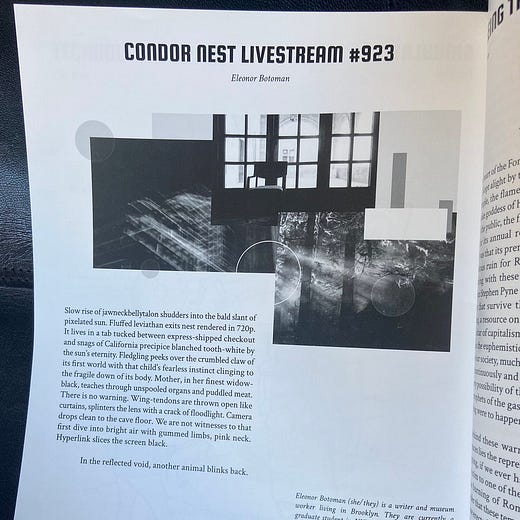⚡️ State of Play
Reboot vibe shift + team reveal + tell us what you want
Hello! Welcome to the hundreds of you who have joined since the release of Kernel Issue Two, and special thank you to everyone who came out to our sold-out launch parties in San Francisco and New York last week. It was seriously magical — no matter how much I love the internet, there’s something concrete and undeniable and real about the aura of a print magazine and crowded room.
If we haven’t met, my name is Jasmine. I’m one of the cofounders of Reboot, alongside Jessica, who has somehow balanced her full-time job, machine learning research, and leading Reboot’s editorial team over the past year — editing both this weekly newsletter and many of the pieces in Kernel. We’re giving her a break while she rotates shapes for a while (read: starts her PhD in Computer Science at UC Berkeley), so I’ll be trying to fill her shoes as interim newsletter editor.
Since there are new folks here, I want to reintroduce the Reboot project, our team, and where it’s headed in 2022 and beyond.
To open the first issue of Kernel Magazine, I wrote an essay called “Take Back the Future!”: a manifesto explaining the personal, philosophical, and historical impetus behind Reboot’s existence. It articulates a “progressive case for techno-optimism,” and it’s still the best artifact I have for explaining the future we’re working toward. Selfishly, I recommend giving it a read.
But a year has passed, and things have changed. Our times are more precedented now. The crypto market has corrected; the vibe has shifted. Peter Thiel has stopped shilling startup gospel and is instead funding anti-woke film festivals in Dimes Square. Critical tech outlets are shuttering, Will MacAskill has ravaged the podcast circuit, and cyberlibertarian dreams aside, the shadow of state power continues to creep into tech (see: Anduril’s $1B DoD deal, TikTok’s China drama).
Moreover, tech discourse actually has gotten better. “Tech isn’t neutral” and “Tech is no panacea” no longer pass for hot takes — we know that technologies are imbued with values, that they have political causes and political effects. The WIRED editors have pivoted away from their techno-utopian origins; Logic Magazine is renewing their commitment to “the Global South, the Black radical tradition, and mixed media.”
How can Reboot continue to meet the moment? What role do we play?
First, we are a community as much as a publication. We are created primarily by and for technologists. We hope to bring theory to practice, then back again — for our ideas not to exist in a vacuum, but to get refined and implemented through discussion. We want to expand our student fellowship and Camp Reboot, host more events in cities and campuses, and use contribution opportunities to build members’ capacities as advocates and leaders. We always put agency first.
Second, we want to show how the sausage is made. Building anything — products, policies, platforms — is full of thorny tradeoffs and hidden nuances. By sharing interviews, reporting, and personal essays from tech workers, leaders, and advocates, we want to spotlight different strategies for systems change in all their messy and multitudinous glory. Per the theme of Kernel Issue Two, the question on all our minds is: How do we get there?
Ultimately, Reboot aims to build the grassroots media and community infrastructure to power a new generation of tech leaders and redefine what “success” and “progress” in tech look like altogether.
Reboot has historically had a very amorphous organizational structure — a wide base of volunteers and flexible hierarchy is important to us. However, scale demands focus. Today, we operate with a core leadership team made up of the volunteers leading our biggest projects: Kernel Magazine, the student fellowship, the newsletter, and events. You’ll get to know the team better in future weeks, but here they are:
Jessica Dai, cofounder, newsletter editor-in-chief, Kernel managing editor
Emily Liu, Kernel editor-in-chief
Matthew Sun, Kernel digital editor
Jake Gaughan, Events lead
Ivan Zhao, Fellowship lead
Lucas Gelfond, Fellowship lead
Jasmine Sun, cofounder and director
We also want to expand the ways the broader Reboot community can co-create this project — your collective expertise far exceeds our own. We’ll keep accepting newsletter pitches, responses to popular essays (our “Replies To” series), and you can always email with any other ideas.1
Finally, if email’s too hard, I’d love some quick poll responses to inform this editor stint:
🌀 microdoses
“Posting is like microdosing legacy,” from Haley Nahman’s latest
If you’re a young, annoying tech-adjacent writer in San Francisco (literally or spiritually), read this interview with Private Citizens author Tony Tulathimutte
A candid reflection on what one designer learned about herself and her work by joining a campaign tech startup in the wake of the 2020 election
Thanks to Rex, Jess, and Sheon for sharing these. I’ll take microdose submissions every week in Substack Threads. Join here!
💝 closing note
There’s still time to order Kernel! Check out our three pre-released pieces, then get the magazine here. And if you’ve already gotten us, feel free to share on Twitter and tag @kernel_magazine :)
Microdosing legacy,
Jasmine & Reboot team
If you have an idea for a collaboration, feedback for the team, or are interested in funding and supporting our work, reply or reach out at jasmine@joinreboot.org.








